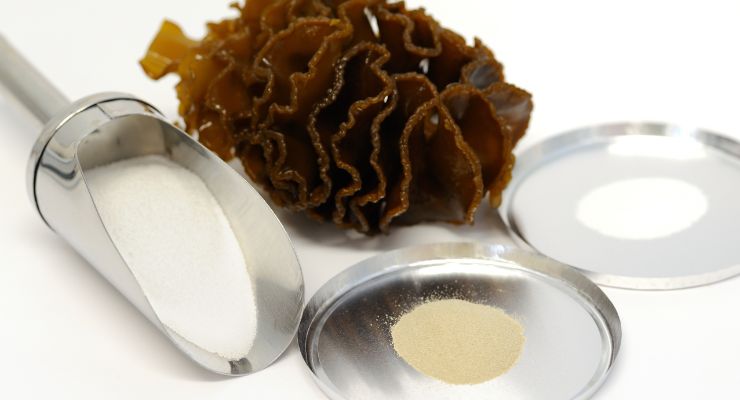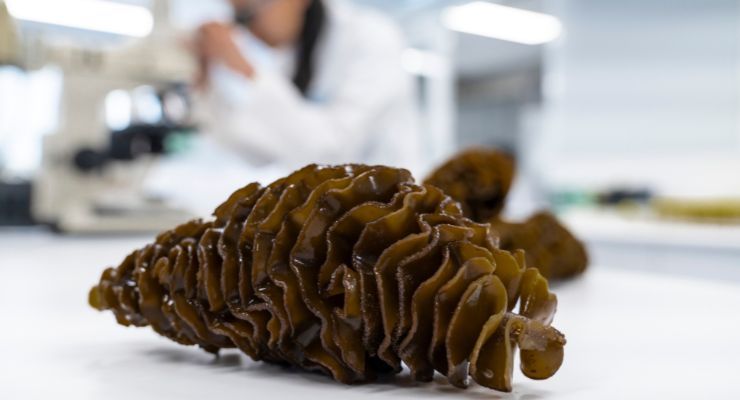Features
Seaweed Science: Marine Compounds Offer Sustainable, Science-Based Solutions for Healthy Aging
A number of countries with extensive marine areas, like Australia, have made significant investments into ‘the blue economy.’

By: Amanda Mackinnon

The world is increasingly turning to seaweeds to address global challenges. From food security through to climate change, seaweeds and their unique bioactive components offer a range of exciting and sustainable opportunities.
Novel marine compounds derived from seaweeds are catching the attention of nutritional formulators. They are ideal inclusions for those seeking innovative ingredients with a clear point of differentiation. Quality seaweed-derived ingredients also resonate strongly with consumers. Demand for natural, sustainably-sourced products has never been stronger, with consumer awareness of fucoidan and other evidence-based seaweed extracts at an all-time high.
What is Fucoidan?
Fucoidans are naturally occurring polysaccharides found in brown seaweeds. Present in the cell walls of the plant, their role in nature is to protect the seaweed from water-borne pathogens and other environmental challenges. Research is increasingly demonstrating that the same properties of fucoidans that are valuable to the seaweed plant may also be beneficial to human health.1Fucoidans first became commercially available in the 1970s. With each passing decade, fucoidan research interest has intensified and there are now more than 2,500 scientific papers attesting to a wide range of bioactivities. Continuing to fascinate scientists, these unique marine compounds boast complex molecular structures and varying degrees of sulfation and acetylation.
Interestingly, experts in marine biotechnology have shown that fucoidan extracted from one species of brown seaweed may exert different bioactivities to a fucoidan extracted from another species of brown seaweed.2
Applications
Formulators committed to quality will be pleased to learn that high purity, certified organic fucoidan extracts with global regulatory acceptance are now readily available. These novel marine ingredients have been specifically developed for nutritional, skin care, veterinary, medical device, and pharmaceutical research applications. They have been clinically tested and demonstrate efficacy in a wide range of health indications.1In recent years, fucoidan extracts have attained regulatory approvals in a number of global jurisdictions for use in food and dietary supplements.1 In particular, fucoidan extracts from the seaweed species Undaria pinnatifida and Fucus vesiculosus, produced by Australian manufacturer Marinova Pty Ltd, have been granted Generally Recognized As Safe (GRAS) status with the U.S. FDA and have also achieved EU Novel Foods Approval.
Versatile and stable across a variety of delivery formats, high purity fucoidan extracts are typically supplied as a dry powder and are ideal for inclusion in capsules, pressed tablets, and bulk supplement powders. They can be utilized as a standalone constituent or easily incorporated with other ingredients. They are also water-soluble and have subtle flavor profiles, allowing for ready incorporation into gels and functional beverages.
Interestingly, some fucoidans have been developed specifically for topical application and are highly sought-after for inclusion in creams, gels, and masks in the global skin care category.3
The Science
The body of evidence supporting the efficacy of high purity fucoidans makes them increasingly popular ingredients for science-based dietary supplements, particularly those targeting immune support, digestive health, and healthy aging.1Although fucoidan was first identified and isolated more than 100 years ago, a vast majority of the research on this natural bioactive compound has been undertaken in the past 15 years. The growing scientific interest in fucoidan is prompting innovative formulators to increasingly turn to fucoidan.
To provide some insight into the breadth of recent research, one animal study has shown that high purity fucoidan supports the production of the most common type of antibody in the body: Immunoglobulin G (IgG).4 Recent in vitro research has demonstrated fucoidan can help balance good and bad bacteria in the gut which may in turn support a healthy gut microbiome.5 Meanwhile, a clinical study involving elite athletes showed that high purity fucoidan can support mucosal immune function, in turn promoting the healthy function of the gut.6
High purity fucoidan extracts from two species of brown seaweed, Undaria pinnatifida (wakame) and Fucus vesiculosus (bladderwrack) are particularly well represented in the scientific literature. Undaria pinnatifida, commonly known as wakame, is a cool water seaweed species native to Japan but now prolific in the pristine ocean waters of southern Australia and Argentina. Fucus vesiculosus, or bladderwrack, is common along the sheltered coastlines of the Northern Hemisphere.
Fucoidans derived from both Undaria and Fucus seaweeds have been extensively researched and clinically tested.1

Proprietary Green Chemistry
Manufacturers of fucoidan have traditionally utilized solvents to precipitate the fucoidan polymer from crude seaweed extracts. This traditional methodology may lead to contaminants being present in the final extract.2 Fucoidans manufactured in this way can suffer from many shortfalls; their quality can be inconsistent, their chemical integrity may be compromised and—most importantly—their bioactivity may be affected.In recent years, proprietary extraction technology has been developed to overcome these problems. Advanced “green chemistry” extraction does not use organic solvents and produces fucoidan extracts that remain unadulterated in chemical structure and free from solvent residues. The mild, aqueous process also ensures the resulting extracts comply with the most rigorous quality standards and regulatory requirements.
Sustainability
The unrivaled sustainability credentials of high-purity fucoidans make them particularly attractive to consumers and formulators alike. The world’s leading fucoidan manufacturers can demonstrate transparency throughout the supply chain—from the sustainable harvesting of wild seaweeds right through to zero-waste manufacturing. Their practices demonstrate alignment to the Sustainable Development Goals outlined by the United Nations.7Extensive research has confirmed that well managed, wild seaweeds are a rapidly renewable marine resource.8 Premium quality fucoidans are derived from seaweed sourced from the cleanest of ocean waters, well away from those parts of the world prone to human, industrial, or agricultural contamination. High-quality source seaweed is essential to the certified organic status of market-leading fucoidans. Hand-harvesting seaweed operations are conducted on an environmentally sustainable basis in accordance with global best practices.
Enhancing the value proposition of superior fucoidan extracts is the utilization of renewable energy. Hydro and solar electricity power some of the world’s most innovative fucoidan producers, placing them on the verge of being carbon neutral manufacturers. Similarly, a commitment to zero waste sees some fucoidan producers diverting all seaweed waste streams away from unproductive landfill and into new, value-added products such as nutrient-rich organic additives for the horticultural sector.7
Marine Bioproducts: The Future
A number of countries with extensive marine areas have begun to invest significantly in the blue economy, particularly in relation to innovative marine bioproducts. One such example is Australia, which recently announced its intention to become a global leader in marine biotechnology—a sector that is forecast to be worth more than $700 billion by 2035.9Surrounded by the world’s third-largest marine area, Australia has committed to accelerating research into the potential of its marine compounds. The Australian Government has invested in a national Marine-Bioproducts Cooperative Research Centre to fast-track $270 million of research over the next decade. The country’s leading fucoidan manufacturer Marinova Pty Ltd—which offers high-purity, certified-organic fucoidans with global regulatory acceptance—is a founding partner in this innovation program.
References
1. Fitton, J. et al. (2019). Therapies from Fucoidan: New Developments. Mar. Drugs 2019, 17, 571. https://doi.org/10.3390/md171005712. Fitton, J. et al. (2015). Therapies from Fucoidan: An Update. Mar. Drugs 2015, 13, 5920-5946. https://doi.org/10.3390/md13095920
3. Fitton, J. et al (2015). Topical Benefits of Two Fucoidan-Rich Extracts from Marine Macroalgae. Cosmetics 2015, 2, 66-81. https://doi.org/10.3390/cosmetics2020066
4. Mathew, L. et al. (2017). Preclinical Evaluation of Safety of Fucoidan Extracts From Undaria pinnatifida and Fucus vesiculosus for Use in Cancer Treatment. Integrative cancer therapies, 16(4), 572–584. https://doi.org/10.1177/1534735416680744
5. Shang, Q. et al. (2016). Dietary fucoidan modulates the gut microbiota in mice by increasing the abundance of Lactobacillus and Ruminococcaceae. Food & function, 7(7), 3224–3232. https://doi.org/10.1039/c6fo00309e
6. Cox, A. et al. (2020). Fucoidan Supplementation Restores Fecal Lysozyme Concentrations in High-Performance Athletes: A Pilot Study. Mar. Drugs 2020, 18, 412. https://doi.org/10.3390/md18080412
7. www.marinova.com.au
8. Mac Monagail, M. et al. (2017). Sustainable harvesting of wild seaweed resources, European Journal of Phycology, 52:4, 371-390, DOI: 10.1080/09670262.2017.1365273
9. https://mbcrc.com/


